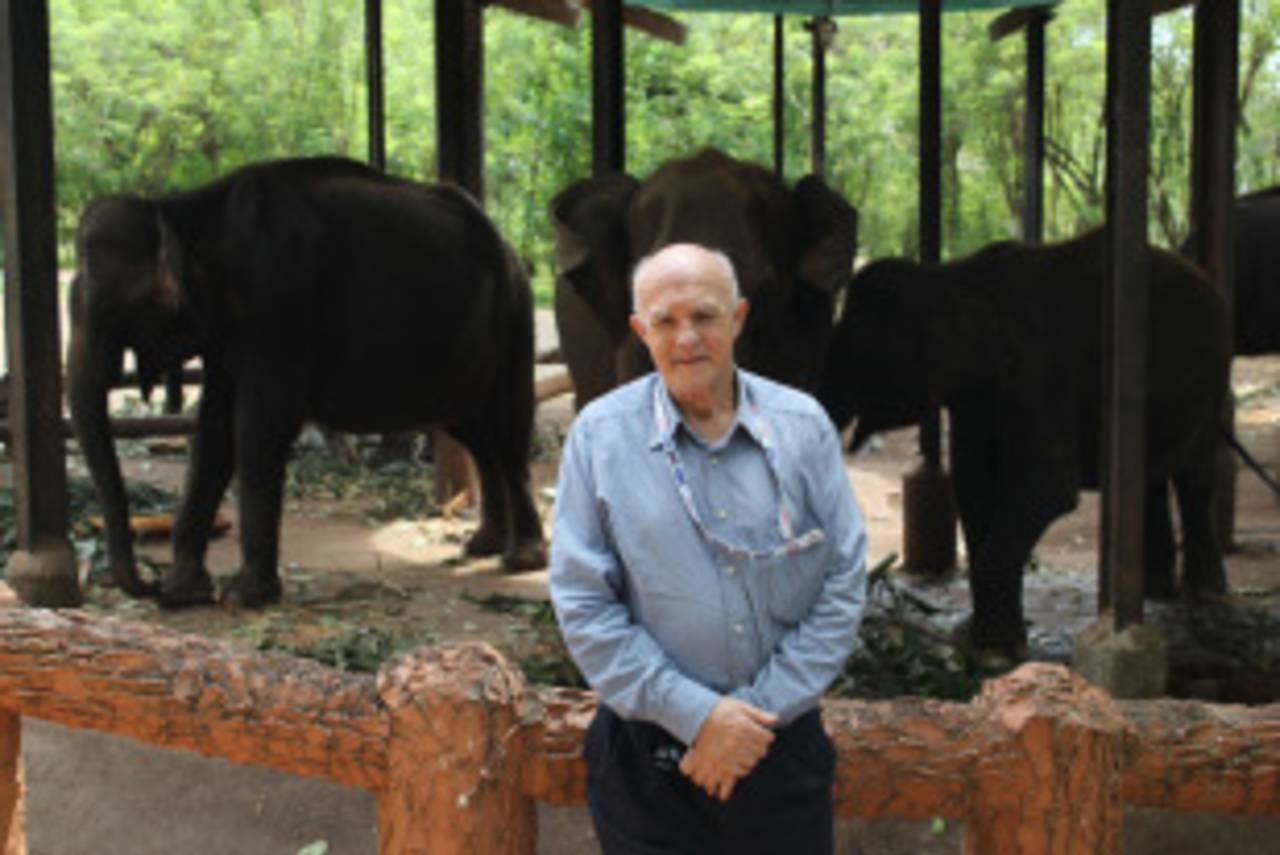Trevor Chesterfield dies, aged 75
Trevor Chesterfield, the veteran cricket journalist and former first-class umpire, has died aged 75 in Moratuwa, Sri Lanka, where he had been living and working for several years
ESPNcricinfo staff
06-Apr-2011

Trevor Chesterfield - pictured here en route to Kandy during the 2011 World Cup - wrote several books, including the biography of South African fast bowler Fanie de Villiers • ESPNcricinfo Ltd
Trevor Chesterfield, the veteran cricket journalist and former first-class umpire, has died aged 75 in Moratuwa, Sri Lanka, where he had been living and working for several years. A regular contributor to various publications and websites across the world, he was also the author of several books, including the biography of South African fast bowler Fanie de Villiers and South Africa's Cricket Captains: From Melville to Wessels.
Chesterfield was present at almost all the World Cup matches held in Sri Lanka last month and appeared in reasonable health, though he had many long-standing medical issues. A couple of days before his death, he went to a talk show and complained of the unbearable cold in the TV studio. On Wednesday morning he fell off his bed while asleep and was taken to the hospital in Moratuwa but is believed to have died on the way.
Haroon Lorgat, the ICC's chief executive, called him a "true lover of the game", a "fair, balanced and fearless journalist with strong views on the game, underpinned by a genuine desire to see cricket continue to flourish."
Cricket South Africa president Gerald Majola said: "His passion for the game knew no bounds, and his astute analysis of the match of the day was always well worth reading."
Sri Lanka Cricket also paid tribute to him for bringing an "international flavor into the local cricket columns" and said readers, cricket administrators, players and fans would miss his writing.
Owen Murray Trevor Chesterfield, or "Chesters", as he was known, was one of the true eccentrics in cricket journalism and was obsessed with the sport - his email handle was lbwbambrose, a nickname given to him by Bob Woolmer and a reference to the limp he was afflicted with following an accident. He lived a global life - born in New Zealand, he moved to South Africa, where he umpired and wrote on cricket before settling down in Sri Lanka, attracted to the warmth of the people and the climate. In between, he found time for a reporting stint in Vietnam during the war - he would speak of reading Cardus in the trenches, and of trying to attract his American colleagues to an alien game.
In South Africa, where he spent most of his working life, he was the long-serving cricket correspondent for the Pretoria News and was a keen follower of the Nashua Titans. He covered several tours in the post-Apartheid years, including the historic first tour of India in 1991. One such tour, in 1993, took him to Sri Lanka and it was there that he eventually settled down.
Jayaditya Gupta adds: An evening with Chesters was never complete without a glass or three of the best wine and hours of conversation about the minutiae of cricket that these days seems to have got lost amid the glitter. He could talk on almost any subject, thanks to his experiences across the globe, but almost always the conversation came back to cricket - and especially Test cricket. He would be genuinely baffled, especially when in India, at anyone who was indifferent to the sport and would take pains to try and sort out the "problem". A stickler for cricket's traditions and code of conduct, he practiced what he preached, wearing a jacket to matches in the heat and humidity of Sri Lanka - and a tie if the match involved New Zealand.
Chesters was a man of the world and his heart belonged to many places. To his native New Zealand, which, he felt, received short shrift from its trans-Tasman big brother in the post-war years; to South Africa, where he was a staunch and vocal opponent of apartheid while he lived there but whose cricket he loved, down to the picture of the Centurion cricket ground on his laptop screen; and to Sri Lanka, where his eccentricities endeared him to an accommodating people.
Yet he loved cricket above everything else and was more than happy to share his thoughts with anyone who had a spare moment - and even with those who didn't. He always made time for younger colleagues and many would benefit from his vast library of cricket books, the size of which was matched only by his wine cellar. He frequently despaired of the direction the game was taking, at the way money was taking centre-stage, but never lost the belief that the basic values and traditions were in place. In an age when cricket writing is fast becoming a collection of sound bytes and focused on celebrity, Chesters was a reminder of the profession's highest standards. He will be missed.